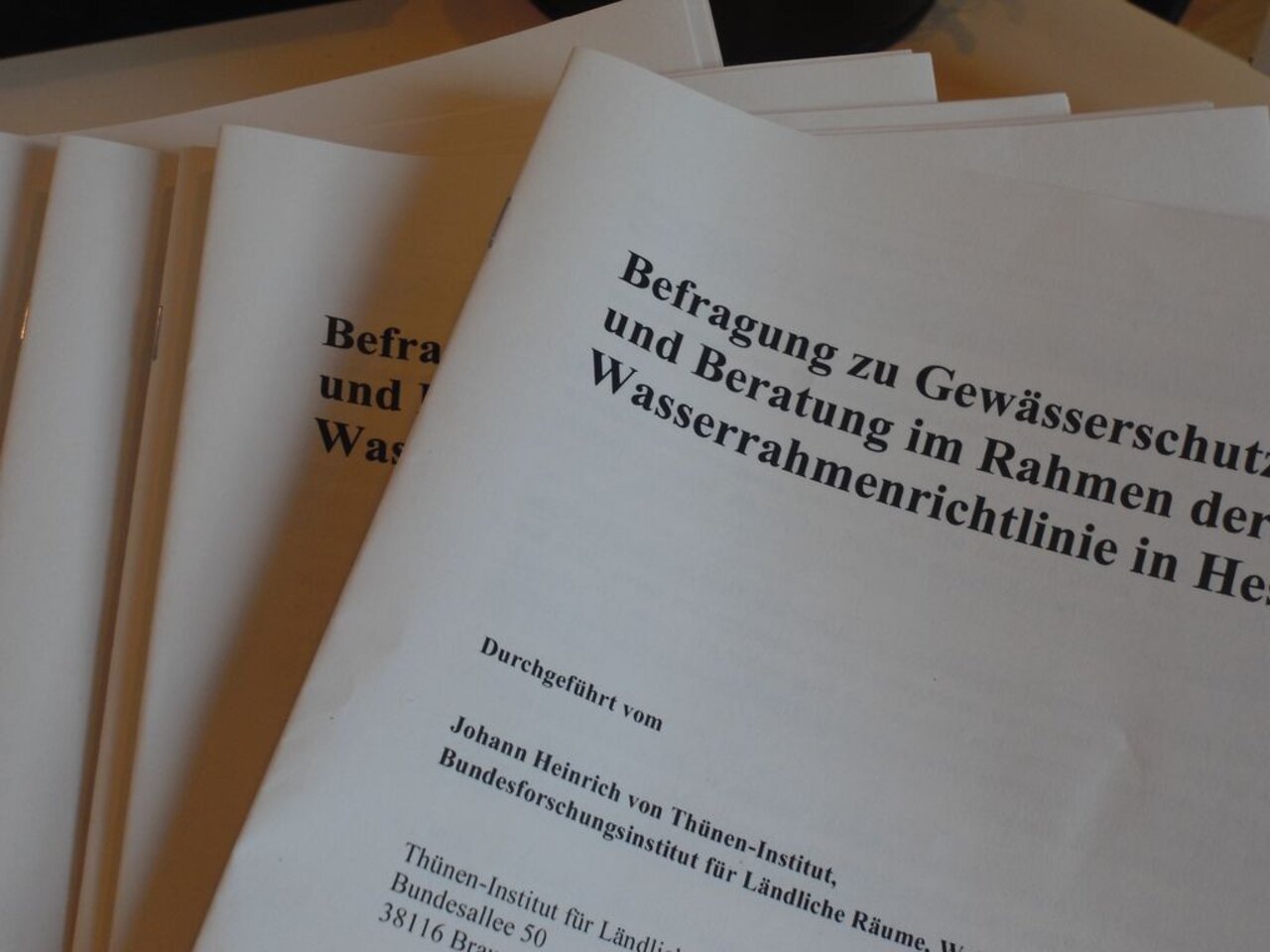Project
Effects of publicly funded extension services on the practice of water conservation

Evaluation of the extension service for farmers to improve water conservation in the context of the Water Framework Directive in Hessen, Germany: impacts on knowledge and behaviour of farmers
When farmers are advised to better account for water conservation practices, does their problem awareness and level of knowledge increase? Do they eventually change their practical behaviour? An in-depth research project in Hessen, Germany, investigated these questions between 2012 and 2015.
Background and Objective
As part of the implementation of the European Water Framework Directive (WFD), the German state Hessen in 2011 established a state-wide extension service scheme for farmers to improve water conservation. The extension services aim at protecting and enhancing water quality as specified in the WFD. From 2012 to 2015, the Thünen Institute of Rural Studies evaluated the extension service. The evaluation considered the services’ effects on farmers’ and winegrowers’ knowledge levels, problem awareness and management changes regarding nitrogen.
The project was part of the “7-Länder-Evaluation” which also evaluates the Rural Development Programme (RDP) of the state of Hessen 2007 to 2013.
Target Group
Public administrations and authorities including state and federal ministries, researchers and NGOs in the fields of agriculture and environmental protection
Approach
Based on a behavioural model of multiple rationalities, the key method applied was a questionnaire survey of farmers and winegrowers in Hessen. This survey was prepared by literature analyses and expert interviews. Once data analyses were finished we validated our findings in workshops with extension workers, farmers and representatives of public authorities. Further in-depth interviews with farmers helped to better understand the findings of the questionnaire survey.
Data and Methods
We apply different methods of empirical social research. In order to prepare the standardised questionnaire survey of farmers and winegrowers we carried out semi-structured expert interviews. The most important data set of the project was created by the questionnaire survey in 2013 (n=1,277). In the final part of the project, further and newly developed research questions are analysed via semi-structured in-depth interviews with farmers that are addressed by specific advisory service as well as with farmers that do not take part in the scheme.
Results
The study showed that even though the extension service had been carried out for only one to two years at the time of the questionnaire survey, farmers’ problem awareness and their competence levels for water protective management were raised and important details of management practices were improved. It seems that bigger management changes like the adoption of catch crops could hardly be induced, at least up to the time of the survey. However, the amount of added nutrients, the time-point for turning over the soil, the choice of varieties of crops and the share of land cultivated with catch crops were important management details which were influenced by the extension service. Even though farmers with higher levels of education and information were somewhat more likely to take part in the extension activities, there was some scope to improve their abilities to in-corporate water protection practices in their management. While extension is not the best suited instrument to induce important cost intensive measures like increasing storage capacity for slurry, it can increase understanding for measures. Time was identified as a decisive factor for the extension services to take effect, and this suggests that the extension service is worth being continued.
Thünen-Contact

Funding Body
-
Bundesland Hessen
(national, öffentlich)
Duration
5.2012 - 5.2015
More Information
Project status:
finished
Publications to the project
- 0
Techen A-K, Ries E, Steinführer A (2015) Evaluierung der Gewässerschutzberatung in Hessen im Kontext der EU-Wasserrahmenrichtlinie: Auswirkungen auf Wissen und Handeln von Landwirten. Braunschweig: Johann Heinrich von Thünen-Institut, 238 p, Thünen Rep 33, DOI:10.3220/REP1446716352000
- 1
Techen A-K (2014) Evaluierung der Gewässerschutzberatung in Hessen im Kontext der EU-Wasserrahmenrichtlinie: Auswirkungen auf Wissen und Handeln von Landwirten : 1. Zwischenbericht. Braunschweig: Thünen-Institut, 164 p
- 2
Steinführer A, Techen A-K, Ries E (2014) WRRL-Beratung auf dem Prüfstand : Thünen-Institut legt erste Ergebnisse vor. Landwirtschaftl Wochenbl Hessen Rheinland Pfalz(29):26-27

![[Translate to English:] [Translate to English:]](/media/_processed_/2/0/csm_LV_Bei_Hornburg_Quelle_Johanna_Fick_neu_da89674833.jpg)
![[Translate to English:] [Translate to English:]](/media/_processed_/2/0/csm_LV_Bei_Hornburg_Quelle_Johanna_Fick_neu_3aae309567.jpg)





